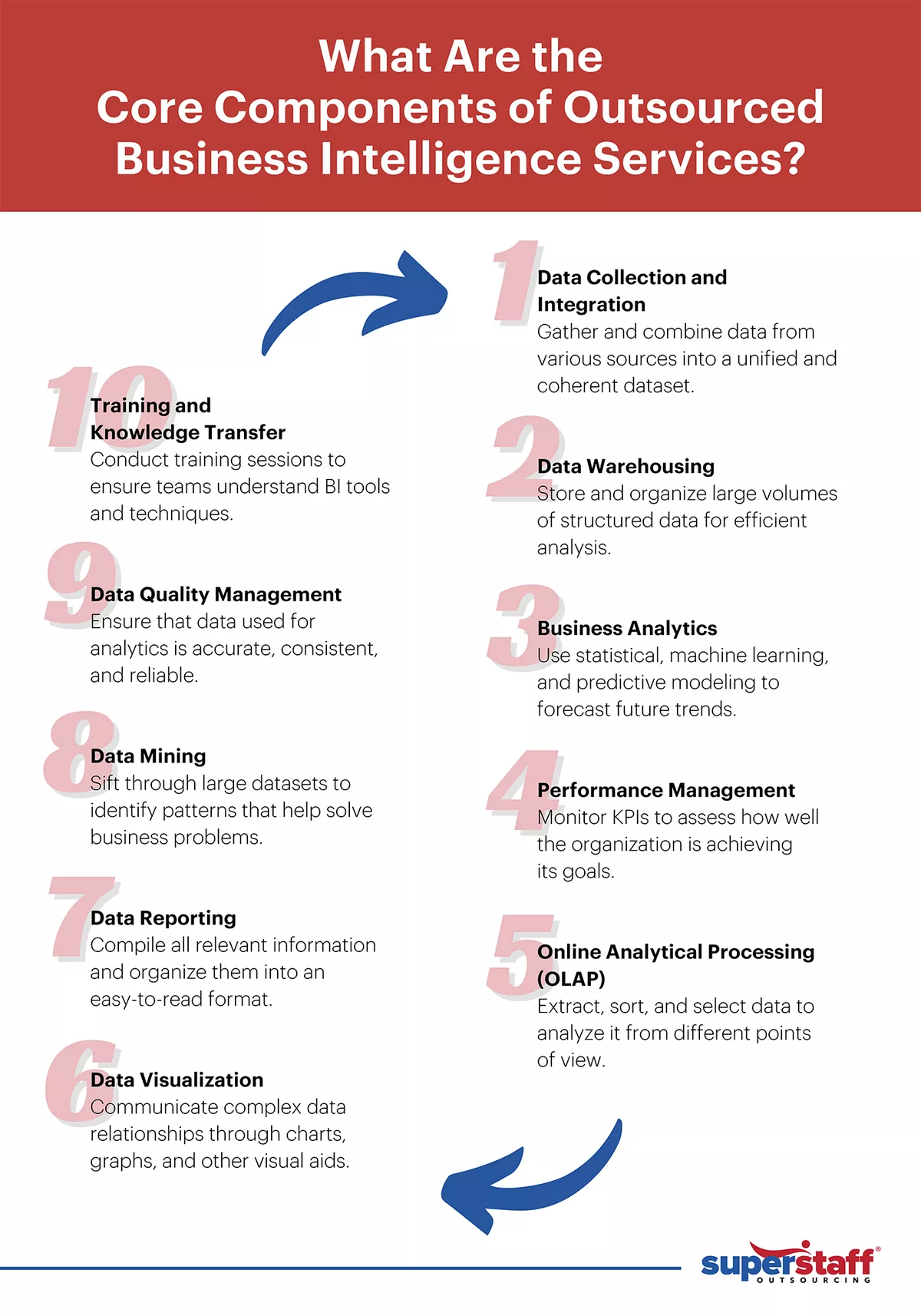
The sheer volume of available data has skyrocketed over the past few years, creating a wealth of opportunities for businesses that know how to harness them. Data in its raw form is not particularly useful, but spotting patterns and gleaning insights from them can transform your operations for the better.
More companies are noticing the potential uses of data in improving business intelligence. In fact, a McKinsey report predicted that organizations and their employees will soon leverage data to optimize nearly all aspects of their daily workload. Industry experts also foresee that smart workflows, facilitated by seamless interactions between humans and AI-powered machines, will become commonplace by 2025.
Even as technologies continue growing and evolving, you can start streamlining your processes as early as today. With help from experienced outsourcing professionals, you can begin investing in business intelligence and safeguard your operations for the future.
Breaking Down the Basics: What Is Business Intelligence?
Let’s start with the basics. Picture this: You’ve got a mountain of data collected from various sources, including purchase orders, customer information, and other valuable facts and figures specific to your business and industry.
How do you transform your growing data collection into a gold mine of insights? That’s where business intelligence (BI) comes into play. It’s the art of collecting, analyzing, and visualizing data to make intelligent business decisions.
As part of the BI process, companies collect data from both internal and external sources and prepare them for analysis. Then, a business intelligence analyst examines the existing datasets, deciphering and organizing them to help executives make more informed choices to achieve their goals.
10 Core Components of Outsourced Business Intelligence Services
➡️Want To Hear More About Data and Business Intelligence Outsourcing? Book a Free Call Now
Having a business intelligence strategy helps companies enhance operational efficiency, improve their bottom line, and achieve a significant advantage over their competitors. However, not everyone has the internal expertise to fill this specialized role.
Outsourcing presents an indispensable opportunity for businesses hoping to invest in BI initiatives but struggling to find qualified analysts. Business intelligence outsourcing (BIO) involves delegating the responsibility of managing and analyzing an organization’s data to external service providers. Here’s what the process typically entails:
Data Collection and Integration
The first step to developing a successful BI strategy is collecting data from various sources, ensuring it is comprehensive and relevant to the business needs. After amassing a wealth of data, combining raw information from disparate sources is essential to create a unified and coherent dataset – and this is where data integration comes in.
Imagine your business data is scattered across different departments, systems, and formats. Data integration is what brings it all together. It blends data from various sources into a unified view, making it easier to analyze and draw meaningful insights from raw information.
The main goal of data integration is to produce consolidated datasets that meet the needs of various end users in the company and ensure accuracy and consistency throughout the data management process.
Data Warehousing
Once you’ve collected and integrated your datasets, the next step is to set up and manage a centralized repository called a “data warehouse.” This secure electronic storage system is used to stockpile and organize large volumes of structured data for efficient analysis.
If data collection is the hunt for unclaimed gold, data warehousing means storing your discoveries in a centralized treasure chest to keep them safe. The goal is to cultivate a rich trove of historical data your organization can access and analyze anytime.
Having a well-organized and managed data warehouse makes it simpler for your outsourced analytics team to sift through the mountains of raw information. They use state-of-the-art BI tools to manage large data volumes, tracking past successes and failures to help you make decisions for the future.
Business Analytics
After storing your valuable data in a secure warehouse, the next step is to examine and analyze the raw information, transforming it into actionable insights. Through data analysis, companies can study stored data and spot patterns, trends, and other meaningful insights to make logical conclusions that support their decision-making processes.
Moving beyond basic techniques, advanced analytics involves using business intelligence tools, statistical models, machine learning, and predictive modeling to forecast future trends. It’s like having a crystal ball that helps you make data-driven predictions and proactive decisions.
When leveraged correctly, business analytics can help executives optimize performance, increase efficiency, and maximize revenue.
Performance Management
Data analysis is not the final step of the business intelligence process. After spotting trends and patterns that you can use to make better business decisions, you must still assess whether or not your strategy has worked – this is where performance management becomes critical.
Performance management in BI focuses on setting and observing key performance indicators (KPIs) to assess how well an organization achieves its goals. It involves setting targets, tracking performance against those targets, and adjusting strategies to optimize business processes.
Analysts use business intelligence tools and methodologies to monitor performance, enabling organizations to track performance against targets and make data-driven decisions. The objective of this step in the BI process is to avoid relying on guesswork and focus on achieving measurable results, aligning metrics with the organization’s overall goals.
Online Analytical Processing
Online Analytical Processing (OLAP) is a crucial component of BI services. It allows executives to sort and select data for in-depth analysis and decision-making. This computing method helps analysts create a comprehensive business intelligence report, spotlighting trends, sales and market forecasts, financial statements, and other valuable information.
OLAP takes data analysis to the next level, letting users interactively analyze multidimensional data from different perspectives. It’s like having a 3D view of your data, enabling users to drill down, roll up, or pivot to understand their business metrics better.
For example, a business owner can request a detailed report showing all of the company’s products sold during a specific month and in a particular location. To assist future sales and marketing efforts in that area and during the same period, they can compare revenue figures from previous years and different locations.
Data Reporting
Once the BI analysts have collected, analyzed, and compiled so much data, how do they ensure executives can understand it? Reporting and querying tools can come in handy for this process.
Data reporting compiles all necessary information and organizes it into a format that’s easy to read and grasp. Using top-notch business intelligence software, users can generate customized reports and queries, transforming complex data into understandable visual formats.
The goal is to create a comprehensive report that answers your audience’s questions and provides logical evidence to inform and support future decisions.
Data Visualization
When presenting your business intelligence data report, you must provide visual aids to support your findings. Charts, infographics, and even animations can be effective storytelling tools, helping you communicate complicated information in an easily digestible manner.
As the adage goes, “A picture is worth a thousand words.” That’s the essence of data visualization. It involves turning your data into visual representations like charts, graphs, and maps, making it easier for decision-makers to quickly grasp complex information and identify trends or outliers.
Data Mining
No, we’re not talking about digging for gold. Data mining is the process of discovering patterns, correlations, and trends within your data. It’s like having a detective for your information, helping you unearth valuable insights that might be hidden beneath the surface.
As one of the core disciplines in data science, data mining utilizes advanced analytics techniques to sort through massive data sets and identify trends that can help solve complex business problems. The goal is to make logical inferences and predictions to assist in budgeting, planning, and forecasting.
Data Quality Management
Relying on inaccurate, incomplete, or obsolete data can be disastrous for your business, leading you to make false assumptions and flawed decisions. As such, your outsourced business intelligence team must provide data quality management to prevent this problem.
Proper data quality management ensures that the information you’re working with is accurate, consistent, and reliable. With the right business intelligence platform and tools, your team can clean, standardize, and validate your data sets, ensuring their integrity.
Training and Knowledge Transfer
Outsourcing providers must also conduct training for in-house teams to ensure they can effectively use and understand the BI tools implemented by the outsourcing provider. Sessions involve transferring knowledge about the BI infrastructure and processes to enhance in-house capabilities.
The Powerful Benefits of Business Intelligence Outsourcing
➡️How Do I Start With My Outsourcing? Book A Free Call
Improved Cost Efficiency and ROI
The importance of data science for companies cannot be overstated. It has become a critical competitive advantage in the modern world, but not all businesses have the necessary in-house capabilities.
Through outsourcing, executives can tap into a pool of specialized skills and expertise without the costs associated with hiring and training an in-house team of business intelligence analysts.
At the same time, outsourcing providers can give businesses access to state-of-the-art BI technology and tools. They can avoid the upfront costs of setting up and maintaining the costly infrastructure while leveraging the technology to their advantage.
Access to Specialized Skills
According to a recent MIT Technology Review poll, 64% of businesses struggle to find tech workers with specialized skills and experience, which prevents them from accelerating their business intelligence initiatives. Instead of spending countless time and money searching for suitable in-house applicants, outsourcing allows you to access niche skills and expertise quickly and easily.
Some analytics functions are universal, but having a dedicated business intelligence team that understands the nature of your business can be crucial for success. In fact, healthcare, supply chain management, and banking are just a few examples of niche industries that outsource data science tasks.
The right outsourcing provider can connect you with professionals boasting decades of industry-specific knowledge, expertise, certifications, and experience. As such, they can provide a higher level of collaborative expertise than an in-house team.
Access to Cutting-Edge Technologies
Business intelligence tools and technologies evolve rapidly. Understanding which programs, devices, hardware, and software to utilize requires specialized knowledge and experience, which not every organization can cultivate in-house.
With outsourcing, your business can access the latest advancements without the burden of constant upgrades or the risk of falling behind the technological curve. AI-powered business intelligence systems can help companies analyze large volumes of data and uncover hidden insights, enabling better-informed decisions that drive businesses forward.
Scalability and Flexibility in BI Operations
Another significant advantage of partnering with an outsourcing provider is the ability to scale your business operations up or down as needed. Trust your BPO partner to support your core business and handle the extra workload without disruptions.
Think of it this way: As your company grows, more customers will want to engage with you. In turn, you will collect more data, adding complexity to your business reports.
Outsourced data science specialists can manage additional workloads, help you navigate economic headwinds, and give you the flexibility to adapt to constantly fluctuating consumer demand and market conditions.
Enhanced Focus on Strategic Business Activities
Data analytics is essential for making more intelligent business decisions. However, performing this process in-house can detract from your core operations, especially when you struggle to recruit qualified professionals.
Instead of getting bogged down by the ins and outs of data analytics and management, outsourcing enables you to focus on your core activities. In turn, you can free up precious time and resources to elevate revenue-driving aspects of your company and prioritize achieving your business goals.
Data Security and Privacy
According to a 2023 Deloitte report, almost half (48.8%) of all C-suite executives are bracing themselves for increased cyber attacks targeting their confidential data and information.
Working with a business intelligence outsourcing partner can be an excellent strategic option if your company lacks the in-house capabilities to protect its most valuable data. These providers often have strict security measures and protocols in place, reducing the risk of data breaches.
Additionally, outsourcing companies are responsible for staying compliant with data protection regulations. As such, they stay up-to-date on the best cybersecurity practices, laws, and industry-specific guidelines.
Increased Efficiency
Handling, analyzing, and securing mountains of data can be challenging. As businesses expand and technologies advance, the size and complexity of data sets can also increase significantly.
With the right outsourcing partner, companies can minimize risks, enhance efficiency, and ensure compliance with data regulations, all while avoiding the time-consuming task of setting up in-house tech infrastructure. At the same time, outsourcing allows for quicker deployment of BI solutions, helping you derive insights from your data sets as soon as possible.
Continuous Monitoring
Outsourced business intelligence professionals handle more than data analysis. They also monitor your secure database continuously, offer real-time support, and watch your data warehouses closely, spotting and addressing issues promptly and minimizing downtime.
Focus on Quality
Ensuring high data quality is made easier through business intelligence outsourcing solutions. Your outsourcing partner has access to world-class tools and is knowledgeable on proven techniques for maintaining top-quality data standards.
Additionally, many outsourcing arrangements are outcome-focused, meaning providers are motivated to deliver results. This alignment of interests ensures a commitment to achieving your business objectives through data-driven insights.
BI outsourcing providers can customize their services to meet your business’s specific needs. Whether creating custom reports or developing industry-specific analytics, outsourcing allows for a personalized approach that highlights only the most relevant insights, patterns, and trends.
Transform Data Into Actionable Insights Through Business Intelligence Outsourcing
➡️SuperStaff Is Trusted By Thousands of Partners. Get To Know Us Too! Book A Free Call
If advanced analytics is beyond your core team’s expertise, partnering with an outsourcing company can be the strategy you need to accelerate your data-driven initiatives.
As a world-class provider of knowledge process outsourcing solutions, SuperStaff can assist you in navigating the complexities (and reaping the rewards) of business intelligence. We can connect you with a massive pool of offshore and nearshore professionals skilled in handling all aspects of the data analytics process.
Contact our team for more information on our comprehensive BI outsourcing services.








